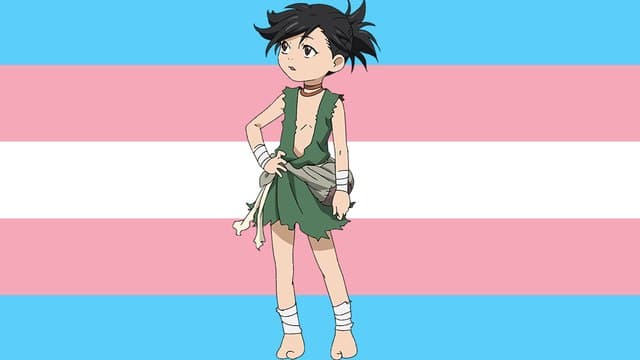At first glance, The Melancholy of Haruhi Suzumiya appears rather whimsical. The show, which originally aired in 2006 and 2009 and is based on a popular series of light novels, follows totally average teen boy Kyon as he accidentally becomes friends with the title character, a manic, overbearing girl who is bored and dissatisfied with everyday life, and spends all of her time looking for aliens, time travelers, and psychics. The X-Files-like club she and Kyon form, the SOS Brigade, eventually contains all three: Yuki Nagato (an alien ambassador sent by an intergalactic intelligence), Mikuru Asahina (a time-traveler), and Itsuki Koizumi (a representative from an “agency” of psychics).
The three other members of the SOS Brigade inform Kyon that, unbeknownst to her, Haruhi is essentially a god. If she carelessly decides she wants the world to be a different way, reality will warp to meet her where she is. (The causality is unclear, but it’s suggested that Yuki, Mikuru, and Itsuki’s existence is itself the result of Haruhi’s desire to interact with paranormal entities.) Kyon must ensure Haruhi never learns about her powers, lest she remake the world in a totally unfamiliar form. He discovers his new purpose: to make life interesting for Haruhi, or else.

Everything Sunny All The Time Always
Superficially, The Melancholy of Haruhi Suzumiya leans hard into the goofiness of that premise. Most of the show’s episodes revolve around the SOS Brigade’s attempts to keep Haruhi occupied, whether it’s a baseball game, the school cultural festival, or an island vacation murder mystery. From a bird’s eye view, Haruhi’s powers are a softly purring sitcom engine that powers low-stakes, silly, slice-of-life high school stories without needing to take seriously the possibility that the world could end. The “melancholy” in the title, Haruhi’s creeping sense of malaise, is something to be overcome through the joys of living. But a deeper sense of melancholy pervades the show’s approach to its own subject matter.
Formally speaking, Haruhi Suzumiya is more or less made from Haruhi’s point of view. Consider the end credits to the first season, set to the infectious song “Hare Hare Yukai.” (The title translates to “Sunny, Sunny Happiness.”) The sequence is an elaborate performance by the main characters that inspired a minor dance craze when the show first aired. The background colors are bright! Haruhi looks and sounds like an idol! The dance moves are fun!
But with the exception of Itsuki, who blithely smiles through pretty much everything, no one is really having fun. Yuki remains stoic and unexpressive, while Mikuru smiles through her teeth, noticeably put-upon, and Kyon is comically disaffected. The characters are being choreographed — by Haruhi — as though they’re the plucky members of a magical girl action squad and not random teen hostages forced to entertain the scary, tyrannical kid from that episode of The Twilight Zone.
To be more explicit: As a club president, Haruhi is an absolute terror. She makes the SOS Brigade spend their weekends hunting for evidence of paranormal phenomenon, berates Kyon at the slightest provocation, and repeatedly sexually harasses poor Mikuru, whose comically moe physicality is frequently pressed into service as part of Haruhi’s schemes. A recurring plot point centers on revealing photos taken to falsely incriminate and blackmail the president of the computer club. If Haruhi were a middle-aged man, she would have already been #Metoo-ed. And in perhaps the biggest injustice she inflicts on the SOS Brigade, she unwittingly forces the entire world to relive the last two weeks of summer vacation literally thousands of times.

Groundhog Daze
Haruhi Suzumiya’s formal interest in the results of boredom gets taken to its brilliant, infuriating conclusion in the Endless Eight, eight episodes dramatizing the summer vacation loop. From a story perspective, the episodes are almost identical, full of mostly mundane outings — the SOS Brigade goes to a festival, they hit the pool, they look up at the stars. Most of the time, Yuki — the only person who remembers everything — updates the gang on how many loops they’ve been through. Small things change, but, by design, it’s never enough for the episodes to actually be compellingly different.
The creative team’s commitment to the bit is perverse: Though one’s initial instinct is to see this as a way to save money, the voice actors actually recorded the same lines over and over, the same scenes are animated from different angles and with the characters in different outfits, and, as fans have pointed out in the many Reddit threads about the episodes, each director employs a different visual motif to explore the repetition. Watching these episodes is, at first, unbearable, and eventually engrossing. It feels dangerously, enticingly capricious, like the whim of a cruel god — which is to say, Haruhi. Everything is exactly the same, the show seems to be saying, episode after episode. Is this what you wanted?
Kyon and the rest of the SOS Brigade only escape their temporal prison by realizing that Haruhi actually does have a limited capacity to imagine the lives of others: Kyon never finishes his summer homework in any of the iterations of summer vacation, but when the entire club bands together to help him get it done, ignoring the fact that the loop is about to restart, they finally wake up on a school day. It’s a solution that expands not only of Haruhi’s perspective, but of the other characters’ as well — it had never even occurred to anyone to think that somewhere under Haruhi’s selfishness, she might be interested in helping people.
And in its partly alarming, partly inspiring wrap-up movie, 2010’s The Disappearance of Haruhi Suzumiya, the series leaves the door open for more substantial, positive change. Scarred by the events of the Endless Eight, Yuki makes Kyon wake up in a world where Haruhi has no powers and everything is totally normal — safer, yes, but also a bit less colorful, and without the potential for anything really new or exciting to happen. She gives Kyon a choice: stay in this new world, or go back to a hectic, vaguely terrifying existence at Haruhi’s beck and call.
Fueled by a selfish desire to keep his own life interesting — and, perhaps, by his unspoken love for Haruhi, Kyon chooses to have things return to the way they were. After a few haphazard time travel escapades, everything gets back to “normal.” The movie, and the series, conclude with Kyon contemplating his return to the SOS Brigade, taking a moment to try Haruhi’s hot pot cooking before going back in time to close yet another loop and save the world he has chosen. It leaves the door open for things to get better… so long as Haruhi doesn’t have a tantrum.

That’s Entertainment!
All of Haruhi’s behavior is rationalized by the other characters — as necessary to maintain the structure of the universe by Yuki, Mikuru, and Itsuki, and as something that makes life fun and interesting by Kyon. The tragedy of Haruhi Suzumiya, such as it is, is that the SOS Brigade not only excuses Haruhi, its members take an entirely fear-based, negative approach to her powers. If Haruhi became dissatisfied with the world or started to blur her fantasies with reality, something terrible could happen — for example, hundreds of years’ worth of time loops — but what if she decided that she wanted to live in a world without scarcity or suffering?
That the potential utopian use of Haruhi’s powers is never even raised, not even by a side character propped as a strawman, is perhaps the saddest thing about the show, smartly consigned to the margins. (No one is capable of imagining what they can’t imagine.) For Haruhi Suzumiya, and for Haruhi Suzumiya, going to the mall on Saturday and eating hot pot is as good as it’s ever going to get. The mindless, goofy entertainments that make up the episodes then, are literal distractions, ways of preventing Haruhi from imagining a different (read: better) world. Far be it from me to engage in an excessively political reading of an anime series about a tsundere god girl, but that’s deeply conservative, and rather depressing. No one even considers the possibility that things could be better beyond satisfying Haruhi’s passing whims.
Never be bored, lest everything fall apart — this is the central principle that governs the SOS Brigade as an organization. It’s an approach to life that Haruhi Suzumiya (and Haruhi Suzumiya) takes to its logical conclusion, but that isn’t really so far out of the ordinary. At the risk of sounding like a dinosaur, it really is increasingly difficult to find time to be productively bored. Not only is there news “happening” at all times and a feed that needs constant refreshing, entertainment is being produced at a rate so vast we have to frantically consume it in unhealthy spurts in order to feel “on top of everything.” And, of course, these are all the moments stolen in between spurts of work, which consumes more and more of everyone’s time, time that Haruhi and Kyon will lose access to once they graduate from high school.

At the risk of sounding even more like a dipshit in an essay about a tsundere anime god girl, Haruhi Suzumiya’s approach to boredom makes me think of David Foster Wallace’s posthumous novel The Pale King, which is itself concerned with the mundane and tedious and what people will do to avoid it. (For a moment, we’ll acknowledge Wallace’s abusive history while using The Pale King’s ideas about boredom for a much more valuable purpose: to talk about anime.)
Everyone in The Pale King is constantly bored, largely because most of the characters are IRS officials who are really into filing forms. Though some of them fight against this tedium, the central thesis of the book eventually reveals itself: working through that boredom, and allowing yourself to continue to work and think and feel in spite of it, is a powerful, borderline spiritual experience, one that is supposed to be mirrored, by extension, in the experience of the reader working through thousands of pages of descriptions of people staring at paperwork. For the most part, The Pale King suggests that giving into boredom can bring you a heightened sense of awareness, something resembling tranquility.
Haruhi Suzumiya acknowledges the potentially transformative power of boredom while begrudgingly admitting that almost no one is capable of accessing it. In an ideal world, Haruhi would be capable of sitting still without potentially destroying reality. Instead, the series seems to give in to her demand for constant activity, and accepts the possibility of finding meaning in those seemingly petty distractions. The conclusion of The Disappearance of Haruhi Suzumiya is as close to a quiet moment as the series gets, for the most part, and it’s framed as a happy ending because it’s one that Kyon chose, one that will keep him and Haruhi together.
Beyond the end of The Disappearance of Haruhi Suzumiya, the closest Haruhi gets to slowing down is the series’ first season finale “Someday in the Rain” which, like the solution to the time loop, locates the key to Haruhi’s emotional awareness and power in her connection with Kyon. It’s possible that caring about others can, if not replace self-enlightenment, then at least provide something else meaningful, something capable of blunting our worst impulses and allowing us to transform the world for the better. It’s a small victory but, The Melancholy of Haruhi Suzumiya suggests, it’s the only one we’re likely to get.


